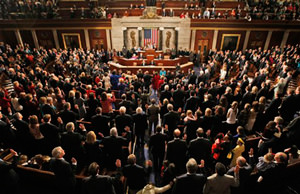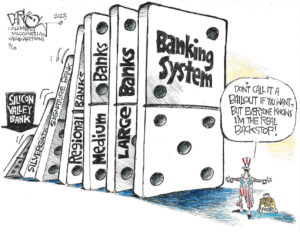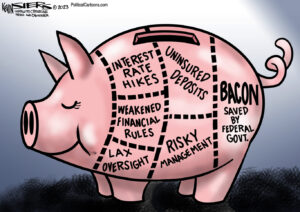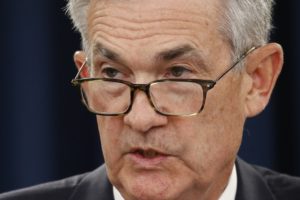Outrage — and Business as Usual
The public face of Congress is angry and outraged at all the bad behavior by banks, but in the other Washington, the financial industry continues to have its way.
A culprit is required. This is an iron rule of Washington policy malfunctions and political malfeasance.
It may be that Angelo Mozilo, the former chief of Countrywide Financial, will become the iconic corporate villain of the mortgage meltdown, much like Kenneth Lay became the personification of the Enron scandal. The Securities and Exchange Commission, with its belated civil charges of fraud and insider trading against Mozilo, lays out a case that does not reveal a web of deceit as extensive as the one Enron wove in the energy trading industry nearly a decade ago. Yet the similarities are striking: Those at the center of the duplicity were aware of the hazard they were creating for their companies and for the economy. Well-connected and politically influential, they continued their charade as upstanding corporate citizens until calamity unmasked them.
The SEC complaint against Mozilo and two other former Countrywide executives portrays a top management that knew the loans the company was pushing — no-money-down mortgages, loans made to those with bad credit or granted without verifying an applicant’s income — were far too risky and very likely to fail. In excerpts from e-mails now posted on the SEC’s Web site, Mozilo describes his concern: “In all my years in the business I have never seen a more toxic product,” one message says.
Yet Mozilo assured the public, investors and Congress that everything would turn out just fine. Meanwhile, he was selling off his own Countrywide stock, in the style reminiscent of Enron executives who ditched their shares while company employees were locked into holding them in their retirement accounts. The SEC charges Mozilo with reaping nearly $140 million in profits from insider stock sales.
“This is a tale of two companies,” SEC enforcement chief Robert Khuzami said in announcing the charges. It is indeed a parable for our times, yet it is incomplete. For even as the SEC pursues a handful of miscreants, much of official Washington moves along a similarly duplicitous track.
The public face of Congress is angry and outraged at all the risky lending, the bad behavior by banks, the way in which giant industries suckered unsuspecting home buyers and the investors who bought the poisonous securities derived from bad loans. This is the image the camera captures at news conferences and congressional hearings where the scapegoats of the moment — be they Wall Street chieftains who make excessive sums or auto executives stupid enough to fly in on corporate jets when called to testify — undergo a ritualized hazing.
In the other Washington — the one where government overseers of the mortgage industry and others on Mozilo’s “Friends of Angelo” list were granted loans on favorable terms — the financial industry continues to have its way.
It won a clear victory in April when the Senate refused to change bankruptcy law to allow judges to revise the terms of mortgages for troubled homeowners — a power that bankruptcy judges already have in regard to other types of loans. The New York Times, in a detailed account of the banks’ strategy to kill the mortgage modification measure, says four financial industry trade groups spent nearly as much lobbying during the first three months of this year as they did in all of 2001.
Meanwhile, The Wall Street Journal reported last week that financial institutions and affiliated trade groups have spent $27.6 million lobbying to relax rules governing how they must account for the value of securities they hold. Already, a loosening of accounting rule changes made in April — under pressure from sympathetic lawmakers — has helped some banks get through the Obama administration’s “stress tests” despite widespread assumptions that the banks were overstating their strength. The industry also is digging in — and doling out money for lobbying and campaign contributions — for a battle over how to regulate derivatives, the financial instruments traded in opaque ways that are among the core contributors to the financial crisis.
This is not an industry humbled. Not by its reliance on billions in taxpayer bailout money, not by its role in precipitating the economic crisis. “At some point the senators in this chamber will decide the bankers shouldn’t write the agenda for the United States Senate,” Sen. Dick Durbin, D-Ill., said as his colleagues prepared to vote against his bid for the mortgage relief provision.
At some point, maybe. But not just now.
Marie Cocco’s e-mail address is mariecocco(at)washpost.com.
© 2009, Washington Post Writers Group
Your support matters…Independent journalism is under threat and overshadowed by heavily funded mainstream media.
You can help level the playing field. Become a member.
Your tax-deductible contribution keeps us digging beneath the headlines to give you thought-provoking, investigative reporting and analysis that unearths what's really happening- without compromise.
Give today to support our courageous, independent journalists.







You need to be a supporter to comment.
There are currently no responses to this article.
Be the first to respond.